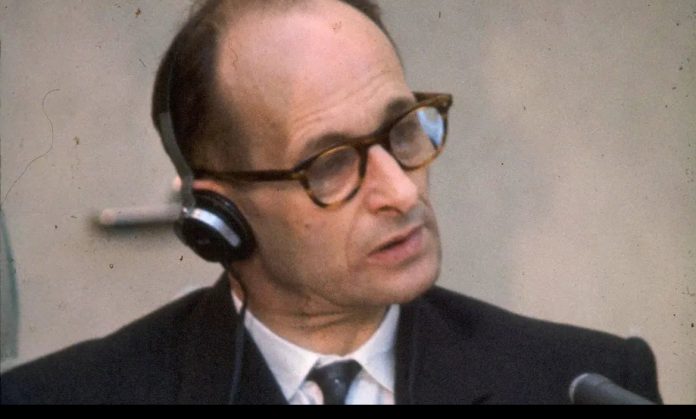The comparison of contemporary Israeli policies to actions to Adolf Eichmann, a principal architect of the Holocaust, is a provocative and contentious topic that warrants careful analysis.
Adolf Eichmann was a high-ranking Nazi official instrumental in orchestrating the logistics of the Holocaust. As the head of the Gestapo’s Office for Jewish Affairs, Eichmann oversaw the mass deportation of Jews to ghettos and extermination camps. His meticulous organisational skills and ruthless efficiency made him a key figure in the systematic extermination of six million Jews during the Second World War. Captured by Israeli Mossad agents in 1960, Eichmann was tried, convicted, and executed in 1962, marking a significant moment in the pursuit of justice for Holocaust atrocities.
In modern discourse, some critics of Israel draw parallels between Eichmann’s actions and Israeli policies towards Palestinians, especially concerning issues like occupation, settlement expansion, and military operations in Gaza and the West Bank. These comparisons often emerge in the context of forced displacements and settlements, military operations, and the policies and mass killings of Palestinians. The expansion of Israeli settlements in the West Bank and East Jerusalem is seen by critics as a form of colonisation and ethnic displacement. The demolition of Palestinian homes and forced evictions are cited as reminiscent of the forced relocations orchestrated by Eichmann. Israeli military actions, particularly in Gaza, which have resulted in significant civilian casualties and destruction, are sometimes compared to the brutal efficiency of Nazi operations, though the scale and intent are vastly different. The systemic nature of the occupation, including checkpoints, the separation barrier, and restrictions on movement, is likened by some to the control mechanisms used by the Nazis to segregate and control Jewish populations.
While these comparisons are provocative, they beg the question ‘why hasn’t those who govern and support Israel learnt from the experiences of their ancestors, in particular the hellish suffering that millions endured?’ The historical context and scale of the Holocaust were unique, with the explicit aim of exterminating an entire people. Israeli policies, while harsh and arguably oppressive, do not necessarily constitute genocide. The intent, scale, and nature of actions are fundamentally different. Instead of gas chambers and shootings there is bombardment and shootings. Complex geopolitical issues can be simplified and thus distort and hinder constructive dialogue. Analogies to the Holocaust can be seen as minimising the horrors experienced by its victims. They can also inflame tensions rather than contribute to a nuanced understanding of the Israeli mass murder and apartheid. Drawing moral equivalence between Nazi genocide and Israeli mass murder risks a form of historical revisionism in which neither side benefits.
The fact that many are comparing contemporary Israeli policies to the actions of Adolf Eichmann is the ultimate concern. How have we got here? While there are elements of Israeli policy that critics argue bear similarities to practices of control and displacement, the context, scale, and intent differ significantly from Eichmann’s role in the Holocaust. Such comparisons require careful and sensitive handling to avoid historical inaccuracies and to foster constructive rather than incendiary discourse. Sadly, intelligent analysis does not save those being murdered right now by psychopaths with weapons or power.
We are told that the Israeli-Palestinian conflict remains one of the most complex and deeply rooted conflicts in modern history. That understanding it requires a nuanced approach that considers historical grievances, political realities, and the human impact on all sides. That analogies to the Holocaust should be made with caution, respect for historical truth, and an awareness of their potential impact on contemporary political and social dialogue.
Fine! Now listen to this summing up by a journalist following the Eichmann trial. ‘What has Israel become?’ is the question the world should ask itself.
KEEP US ALIVE and join us in helping to bring reality and decency back by SUBSCRIBING to our Youtube channel: https://www.youtube.com/channel/UCQ1Ll1ylCg8U19AhNl-NoTg AND SUPPORTING US where you can: Award Winning Independent Citizen Media Needs Your Help. PLEASE SUPPORT US FOR JUST £2 A MONTH https://dorseteye.com/donate/







